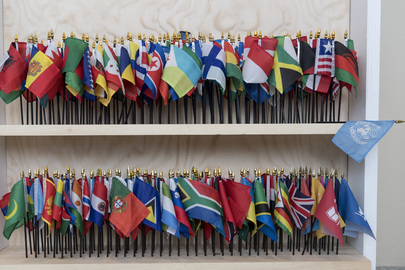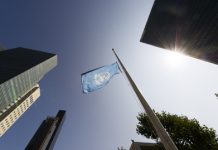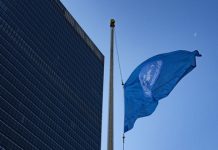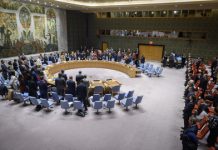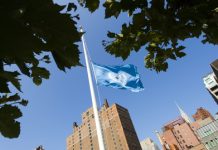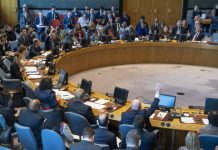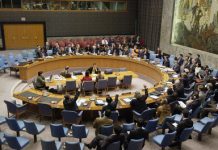Dr. Ibrahim Abubakar, a professor of infectious diseases at University College London, issued this warning at a recent meeting of the UN Economic and Social Council (ECOSOC) in New York.
It is not a question of if but when, and Dr. Abubakar believes the answer is sooner than anyone wants in part because the global healthcare system remains drastically siloed.
This is a problem because, intrinsically, a pandemic cannot be stopped by one country alone.
“Infectious diseases will not respect borders. Therefore, health systems to ensure equity, dignity and universal access must also be agile to implement policies across borders,” Dr. Abubakar said.
Rather, stopping pandemics — and promoting broader global development — requires robust partnerships and consistent investment in multilateral systems as a practice, not just an ideal.
“If we are to meet the ambitions of the 2030 Agenda, we must reimagine cooperation, not as a transactional action but as a dynamic, inclusive and future-ready partnership,” said Lok Bahadur Thapa, vice president of ECOSOC.
A goal to unite all goals
The High-Level Political Forum (HLPF) on Sustainable Development is convening at UN Headquarters in New York to discuss progress – or lack thereof – towards the globally agreed 17 Sustainable Development Goals (SDGs).
The first 16 SDGs deal with specific aspects of development — such as poverty, gender equality and climate change — but the 17th puts forward a path to achieve the others. And this path lies in embracing global partnerships between State governments, civil society organizations, communities and the private sector.
However, with an annual financing gap for the SDGs which exceeds $4 trillion, the partnerships of today are not sufficient to realize the goals for tomorrow.
“We must forge truly transformative partnerships that break traditional silos: governments, civil society, the private sector and multilateral institutions all have roles to play in an inclusive coalition for sustainable development,” Dima Al-Khatib, director of the UN Office for South-South Cooperation (UNOSSC) said at an HLPF event.
Prioritize prevention, not reaction
Right now, the current health system, which includes pandemic preparedness, is oriented towards halting health emergencies once they emerge as opposed to proactively preventing them, according to Dr. Abubakar.
Member States recently adopted a pandemic prevention treaty which endeavours to do just this — limit the likelihood of future pandemics.
But for many, this emphasis on prevention extends beyond pandemics to issues like rehabilitation services and primary care, both of which experts say are critical investments not only in human well-being but also in peace and security.
Moreover, these types of preventative medicine are cheaper than reactive medicine, according to Mandeep Dhaliwal, the Director of Health at the UN Development Programme (UNDP).
“It’s important to invest in prevention as much as it is in treatment, and it is more cost-effective because … you’re turning off the tap,” Ms. Dhaliwal said.
However, convincing investors to support preventive care can be difficult because, when done correctly, tangible results are not necessarily visible.
Health is in every system
Nevertheless, investing in preventive medicine like primary care and the socioeconomic determinants of health — such as climate and nutrition — can help ensure that health systems are holistically supporting people before a crisis begins.
“Health is not a silo… the factors that influence health are often outside the health sector,” Ms. Dhaliwal said, citing the example of air pollution which is a climate problem that inherently influences health.
This sort of holistic investment requires robust partnerships which work to ensure that every initiative — no matter how seemingly distanced — considers health implications.
“We have too often treated [health] as a downstream issue, something that improves only if other systems are working. But we now understand that health and well-being is not simply the result of good developments. It’s the starting point,” said Tony Ott, a professor of agricultural sciences at the Pennsylvania State University.
The weak link in the health system
Migrants and displaced people tend to be among those least likely to have access to preventive medicine and often those most impacted by the social determinants of health.
“Migration and displacement, whether it’s driven by conflict, climate change or economic factors, are defining factors in terms of our health,” he said.
By the end of 2024, 123.2 million people were forcibly displaced worldwide, a decade-high number which proves that in the 10 years since the SDGs were adopted, the world has regressed in relation to displacements.
For Dr. Abubakar, these displaced people — and the millions more voluntary migrants — embody why the health system simply cannot continue to silo itself and must instead embrace cross-border partnerships.
“Health systems must ensure access to essential services regardless of immigration status … Any community without access is that weak link that may mean we are all not protected,” Dr. Abubakar said, referring to the next pandemic.
Communities at the centre
The idea of partnerships as foundational to achieving the SDGs is logical for many people. After all, the goals are universal in nature and demand global collaboration.
But this collaboration, especially for health, must do more than just engage experts — it must engage the people who seek out healthcare. Dr. Abubakar said that all health policies must be culturally appropriate to local contexts, something which can only happen if communities are placed at the centre of healthcare.
“The new future that I see would embrace global partnership, including countries irrespective of income level, public and private sector, academic and civil society. And within this framework, communities must be at the centre… not just as recipients but as co-creators of solutions.”
Source of original article: United Nations (news.un.org). Photo credit: UN. The content of this article does not necessarily reflect the views or opinion of Global Diaspora News (www.globaldiasporanews.com).
To submit your press release: (https://www.globaldiasporanews.com/pr).
To advertise on Global Diaspora News: (www.globaldiasporanews.com/ads).
Sign up to Global Diaspora News newsletter (https://www.globaldiasporanews.com/newsletter/) to start receiving updates and opportunities directly in your email inbox for free.


